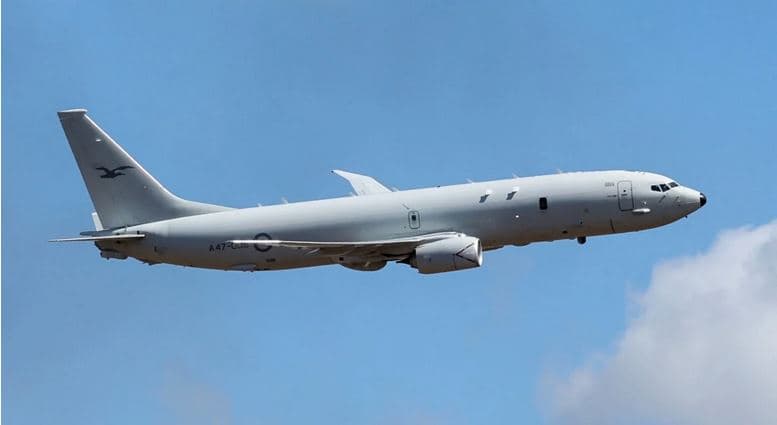We're loading the full news article for you. This includes the article content, images, author information, and related articles.
Kenya calls for de-escalation and adherence to international law following a recent aerial encounter between Australian and Chinese military aircraft over disputed territories in the South China Sea, highlighting the importance of regional stability for global trade and security.

Nairobi, Kenya – Kenya has expressed its concern over a recent incident involving Australian and Chinese military aircraft, urging both nations to exercise restraint and uphold international law. The call for de-escalation comes after an Australian surveillance plane and a Chinese fighter jet had a close encounter on Sunday, October 19, 2025, over international waters, an event that has sparked diplomatic tensions.
According to Australia's acting Prime Minister, Richard Marles, a Chinese fighter jet released flares 'very close' to an Australian surveillance plane. However, China has countered this claim, with air force spokesperson Li Jianjian stating that the Australian aircraft 'illegally' entered its airspace over islands whose sovereignty is disputed by China, Vietnam, and Taiwan.
Australia's Defence Industry Minister, Pat Conroy, refuted China's assertion, clarifying that the incident occurred over international waters. 'This incident occurred over international waters. We conduct these patrols on a regular basis, always over international waters, and we maintain that what occurred was unsafe and not according to how a professional military should conduct itself,' Conroy stated. He further emphasised that the Chinese military, like all militaries globally, should operate in a safe and professional manner.
The South China Sea is a critical geopolitical hotspot, with several nations, including China, Vietnam, the Philippines, Malaysia, Brunei, and Taiwan, laying claim to various islands, reefs, and maritime features. These disputes are driven by strategic interests, rich fishing grounds, and significant oil and natural gas reserves. The militarisation of some of these disputed islands by China has been a point of contention for many years, raising concerns about freedom of navigation and regional stability. Kenya, as a maritime nation with significant trade interests, closely monitors developments in international waters.
International law, particularly the United Nations Convention on the Law of the Sea (UNCLOS), governs maritime activities and airspace. UNCLOS defines territorial waters, exclusive economic zones (EEZs), and international waters, providing a framework for states' rights and obligations. The principle of freedom of navigation in international waters is a cornerstone of global trade and security, a principle that Kenya strongly upholds. Any actions that impede this freedom or escalate tensions are viewed with concern by the international community.
Beyond the immediate parties of Australia and China, other nations in the Indo-Pacific region, as well as global powers, are keen observers of these developments. Testimonies from defence officials on both sides highlight the differing interpretations of the incident and the underlying territorial disputes. The international community, through various diplomatic channels, often calls for peaceful resolution and adherence to established international norms.
The ongoing tensions in the South China Sea, exacerbated by incidents such as the recent aerial encounter, pose significant risks. These include the potential for miscalculation, accidental escalation, and disruption of vital shipping lanes. For Kenya, a stable global maritime environment is crucial for its import and export trade, much of which traverses these international waters. Instability in key shipping routes can lead to increased costs and supply chain disruptions.
The precise details of the incident, including the exact distance between the aircraft and the specific manoeuvres performed, remain subject to conflicting accounts. China's claim of 'illegal' entry into its airspace over disputed islands is a key point of controversy, as international law generally recognises freedom of overflight in international airspace. The extent to which intelligence gathering activities contribute to these encounters is also often a point of contention.
The incident occurred on Sunday, October 19, 2025. Following this, both Australia and China have issued statements presenting their respective versions of events. Diplomatic channels are expected to be engaged to address the matter. The international community will be watching for further statements, any potential investigations, and efforts towards de-escalation.
Observers will be closely monitoring diplomatic exchanges between Australia and China, as well as the reactions from other regional and international actors. The broader implications for freedom of navigation and overflight in the South China Sea will remain a key area of focus. Any shifts in rhetoric or military posturing will be scrutinised for their potential impact on regional stability.
Keep the conversation in one place—threads here stay linked to the story and in the forums.
Sign in to start a discussion
Start a conversation about this story and keep it linked here.
Other hot threads
E-sports and Gaming Community in Kenya
Active 9 months ago
The Role of Technology in Modern Agriculture (AgriTech)
Active 9 months ago
Popular Recreational Activities Across Counties
Active 9 months ago
Investing in Youth Sports Development Programs
Active 9 months ago